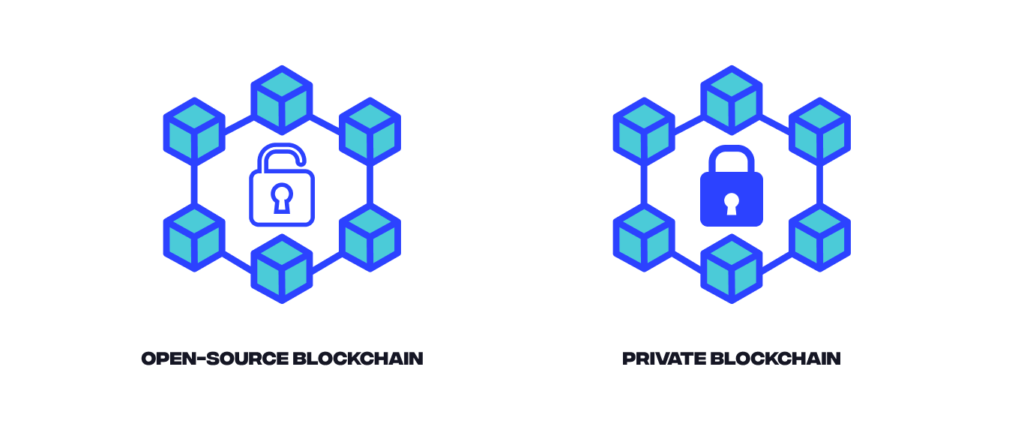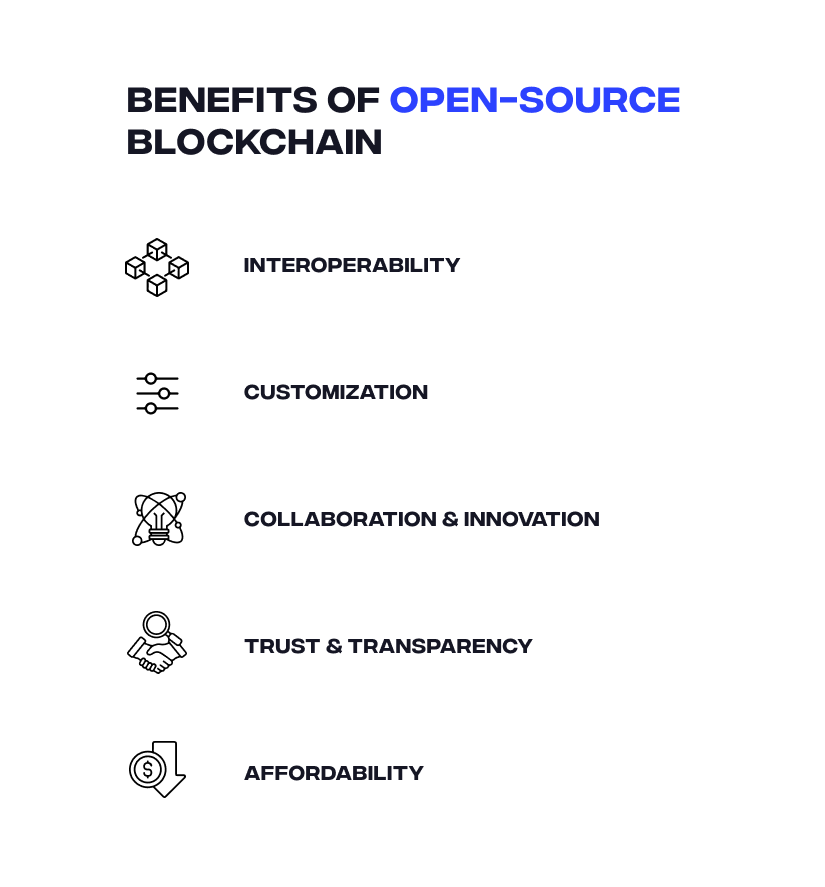- CrustLab /
- blog /
- Technology /
- The Best Open Source Blockchain Platforms You Need To Know
The Best Open Source Blockchain Platforms You Need To Know
Blockchain technology has emerged to be one of the latest developments and biggest technologies of the modern-day internet, transforming various industries. Multiple blockchain development companies and startups have been building blockchain platforms which are either open source or proprietary.
An open source platform has its source code publicly available to everyone, which means anyone can read, modify, copy the code, or validate transactions on the platform. The nature of a blockchain platform (whether open source or closed source) will have varying implications for individuals or organizations that adopt these platforms or choose to build on them. In this article, we’ll explore the best blockchain open source platforms and all you need to know about them.
- Blockchain platforms can either be open to the public (open source) or owned by a corporate entity (proprietary).
- In open source blockchain platforms, all individuals have the same rights and anyone can participate in validating network transactions. Platform governance is consensus-based and developers can also make improvements to the source code.
- Open-source blockchain technology is known to foster an environment of collaboration and innovation while ensuring open accessibility to all users.
What is an Open-Source Blockchain Platform?

The best blockchain platforms can either be open to the public (open source) or owned by a corporate entity (proprietary). So what is open source blockchain? An open-source blockchain platform is a type of public blockchain platform where anyone can join and participate in validating network transactions.
This is in contrast to a private blockchain platform which is controlled by a single entity and only employees or partners of that corporate entity are allowed to join, read, and add data to the ledger.
On open source blockchain platforms, all individuals have the same rights and everyone is kept anonymous. Each individual on the network is assigned a unique cryptographic code, which can either be a public or private key. Unlike private or enterprise blockchain platforms, no single entity can override, edit, or replace the data on an open-source blockchain network.
Reasons to Choose Open Source as a Blockchain Technology?
To choose the best blockchain open source software for personal or corporate use, you’ll have to compare the pros and cons of open source platforms to that of private platforms. Generally, open-source blockchain technology is known to foster an environment of collaboration and innovation while ensuring accessibility for users.
This makes it a powerful tool for developing scalable decentralized blockchain applications. Here’s a closer look at some of the reasons you might want to choose open source blockchain over enterprise blockchain technology.

Interoperability
Open-source blockchain platforms offer more flexibility and also tend to be quite compatible with other platforms or external systems. This makes them particularly suitable for projects where interoperability with multiple networks or systems is a priority.
For instance, when building supply chain management projects that leverage blockchain technology, multiple systems will have to be integrated for a complete interconnected system. The interoperability needed for such large-scale projects is significantly easier to handle when the different components are being built on an open-source platform.
Customization
With enterprise or proprietary blockchain platforms, the extent of customization depends on how far the corporate entity behind the project wants it to go. One thing that open-source blockchain software users enjoy is the freedom to customize and adapt the blockchain technology to their specific business needs. This is valuable for building an open source blockchain project that needs to be tailored to the unique needs of your organization.
Collaboration & Innovation
On open-source platforms, there’s a large community of developers and contributors working together to improve the platform source code. A collaborative environment like this fosters innovation as users build upon existing technologies since it brings diverse perspectives and skill sets together.
Trust & Transparency
Open source solutions perfectly capture one of the biggest benefits of blockchain technology which is transparency. Although proprietary blockchain platforms still operate on a public ledger system, fewer users are required to verify financial transactions.
The entity behind a private blockchain can also override, edit, or delete unnecessary entries, which isn’t possible on public networks. The transparent nature of open-source platforms makes them suitable for projects where trust is a priority.
Affordability
Most open-source platforms are free or super affordable because they do not charge users a licensing fee. This makes them a cost-effective solution, especially for organizations, startups, and non-profits on a limited budget.
Open source blockchain platforms truly democratize access to cutting-edge solutions, creating opportunities for growth and development regardless of how much you can afford to spend. The apps built with these platforms are also scalable with low latency which further reduces costs.
Top Open Source Blockchain Projects in 2024
There are several top open-source blockchain platforms that serve as the foundation of various decentralized projects or applications being built for various industries. Each of these platforms has its unique features and capabilities, but their ultimate purpose is to allow developers to build innovative blockchain solutions for different industries. Here are a few of the top open source blockchain platforms to consider.
Ethereum
Ethereum was introduced in 2013, which means it is one of the oldest platforms in the blockchain space, with a popularity level almost on par with Bitcoin. Although it has its own native cryptocurrency and powers digital assets, Ethereum is more well-known as a versatile open-source platform for creating and deploying decentralized applications (dApps). It’s the perfect solution to adopt if you want to build an open source project on a decentralized network.
In addition to building decentralized applications, Ethereum is also famous for its self-executing contracts which ensure efficient, secure, and transparent digital transactions.
In the past, Ethereum transactions were verified through a Proof-of-Work system where miners create new blocks by solving complex mathematical puzzles. This was found to be costly and energy-intensive. Consequently, the Ethereum platform adopted a Proof of Stake consensus mechanism where participants validate transactions by staking their own cryptocurrency as collateral.
Hyperledger Fabric
Hyperledger Fabric is a blockchain development framework by the Linux Foundation. Although it is an open-source platform, it is focused on permissioned, private blockchain networks, which means all participants still have to be verified and authenticated. This extra layer of transparency makes it easier for enterprises to adopt the Hyperledger Fabric platform for their blockchain development needs.
As a massive open source platform, more than 15,000 engineers and 120,000 organizations currently collaborate on the Hyperledger Fabric platform. Hyperledger Fabric is a distributed ledger platform with a modular architecture. This means it consists of various components organized in the form of pluggable installations that facilitate the quick and efficient development of scalable decentralized apps.
Transactions on this platform are facilitated by consensus algorithms like Practical Byzantine Fault Tolerance (PBFT), RAFT and Solo. The use of multiple consensus algorithms enables enterprises on the network to choose the consensus mechanisms that are most suitable for their needs.
Corda
The Corda platform is an interoperable, open network where organizations can collaborate seamlessly and transfer value directly in a trusted environment. Corda uses a completely novel consensus mechanism to facilitate low cost transactions and sensitive data transfer on its network.
Although transactions are cryptographically linked, they’re not grouped into blocks as in the standard blockchain. The implication of this is that transaction processing is quick and in real time.
The biggest application of the Corda Network is still in the financial industry where it has received widespread adoption because it facilitates quick transactions and secure data exchange. However, it has also been adopted across several other industries as well including healthcare, and insurance, and supports digital assets like non fungible tokens.
Tezos
Tezos is a decentralized smart contracts and applications development platform. It is a user-governed and user-centric platform designed to evolve as developers actively participate to validate transactions, evaluate the platform, and propose changes to the platform’s blockchain frameworks.
As a decentralized finance platform, Tezos is powered by a Proof of Stake consensus algorithm which is more lightweight and efficient compared to other Blockchain implementations.
The Tezos platform is built on a dynamically upgradable protocol that users can adapt to their specific needs. Developers can add new key features to the Tezos platform without forking the entire system thanks to the on-chain upgrade mechanism. Tezos is supported by an active developer community that has implemented various enhancements to the platform such as improving performance and increasing the size limit on smart contracts.
ConsenSys Quorum
The Quorum blockchain platform was originally developed by JPMorgan Chase. The core framework of this platform was built on the Ethereum platform and has been optimized to support high-speed transactions on a secure network. Consequently, Quorum has been heavily adopted by companies in the financial sector looking to build high-performance applications for trade finance, supply chain finance, and the tokenization of financial assets.
In 2021, ConsenSys bought Quorum from JPMorgan and subsequently integrated the platform’s assets into its own work to create the ConsenSys Quorum open source protocol layer. This protocol can be used by enterprise clients to accelerate the development of enterprise applications and tools to complement other Ethereum-based technologies.
Despite being a publicly accessible platform, Quorum distinguishes itself by offering robust privacy features and ensuring the confidentiality of all transactions thanks to a permissioned modular architecture.
Avalanche
Avalanche is an open-source blockchain system designed for building decentralized apps and creating custom blockchain networks. However, it can also be used for general-purpose smart contract execution. The unique framework of this blockchain software allows multiple stakeholders to create an independent but interconnected blockchain database that is securely validated by a dynamic set of users.
The system is generally governed by the proof-of-stake mechanism, with only a small, random subset of network participants needed to confirm transactions. Avalanche is used for building custom blockchain apps with a specific focus on scalability, flexibility and performance.
EOSIO
EOSIO is an open-source blockchain protocol launched in 2018. It is a smart contracts platform optimized for the development of decentralized applications with great speed and flexibility. In addition to validating transactions through a proof of stake system, EOSIO also supports a consensus-based governance system which gives all users equal opportunities to vote on changes to be made to the platform.
The EOSIO platform is suitable for enterprise-grade use cases and has also been adopted for public and private deployment. Thanks to its open-source nature, the platform is customizable to suit a wide range of business needs across industries. So far, more than 400 decentralized apps have been built on this platform.
FAQ
No. Although blockchain technology in itself is open-source (in the sense that it is permissionless), not all blockchain platforms are open source. Some platforms are proprietary or enterprise owned which means they’re controlled by a single corporate entity who determines how changes are made to the system rather than being controlled by being open to the general public. Of course, there are several open-source blockchain projects such as the ones listed above.
Open source blockchain platforms are open-to-public networks where anyone can join and actively take part in validating network transactions. In open source platforms, all users have the same rights and developers can vote on or implement changes to the platform. Examples of such open source blockchain platforms include Ethereum, Solana, Corda, Tezos, IOTA and so on.
Yes. Ethereum is an open-source decentralized platform that powers smart contracts and decentralized applications. In fact, it is one of the most popular examples of an open-source blockchain platform. The Ethereum codebase is publicly available and participants on the network get to participate in the consensus process that powers transactions on the platform by staking their cryptocurrency.
Yes. Bitcoin is an open source platform. It operates on a peer-to-peer network that isn’t controlled by a central authority. In addition to being decentralized, the design and code are also public, which means everyone can take part in validating transactions and examining the code to understand how transactions are processed and secured on the network.
Smart contracts are self-executing digital contracts stored on the blockchain. Once deployed on the blockchain, the code within the smart contract executes automatically when predetermined conditions are met. The self-executing nature of smart contracts makes them valuable for dispute resolution and executing agreements between participants without the involvement of any third-party intermediary among other smart contract capabilities.
